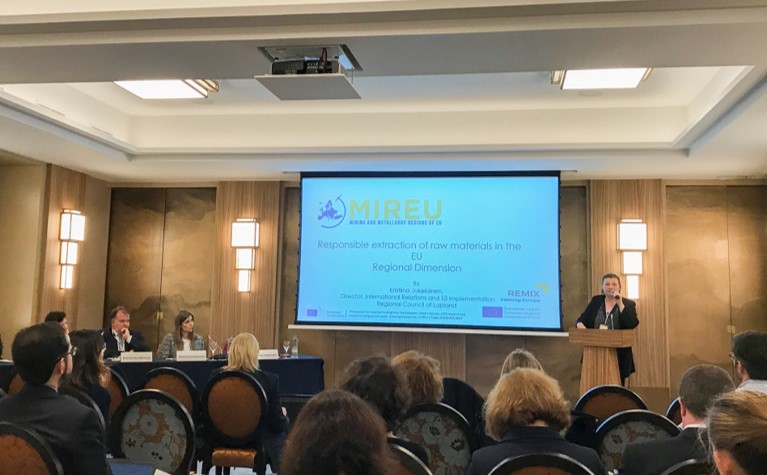
MIREU at the EU Raw Materials Week
- Tue, 12/02/2019
The EU Raw Materials Week is the annual event organised by the European Commission in Brussels, where the raw materials community comes together to take part of the latest news on raw materials in the EU and to discuss and exchange on relevant issues. Several MIREU project partners participated in the sessions, which covered a broad range of topics related to raw materials, either as panellists, presenters, moderators or participants. The presentations of the MIREU partners did not only contribute to great discussions, but they also showcased the vast knowledge and expertise that is present within the project.
An important challenge that the raw materials industry constantly tackles is the views of the general public on mining and minerals exploration. Therefore, the conference included a session on how to improve public perception of critical raw materials. Pamela Lesser, who is the work package leader for MIREU’s work on social licence to operate (SLO), participated in the session as a panellist. Although the emphasis was more on the technical aspects of recovering critical raw materials, there were lively discussions around the importance of meaningfully engaging communities throughout the mining lifecycle. The need to also socialise technology was brought up highlighting that those who are most affected have the right to understand how the technology works and may affect them, their families and the surrounding community.
Kristiina Jokelainen from the Regional Council of Lapland presented the MIREU and REMIX projects as good examples of regional collaboration between European mining and metallurgy regions in a session focusing on the responsible supply of raw materials. In her presentation, Jokelainen highlighted the importance of such collaboration and presented the application for an S3 partnership on mining industry and global value chains, under the Smart Specialisation Platform for Industrial Modernisation, submitted by several MIREU and REMIX regions. The aim of the partnership is to strengthen regional and interregional innovation capacities to facilitate investments, growth and employment in the mining industry as well as in related industries and services in the regions.
Another significant issue that was discussed in one of the sessions is the reconciling of sourcing and extraction of raw materials with the protection of ecosystems and biodiversity. Anna Ostręga from AGH University of Science and Technology in Krakow presented a case study from Poland on this topic. The case study was about the Tarnowskie Lakeland in Poland and presented an example of the enrichment of biodiversity in the process of reclamation and revitalisation of post-mining areas through sustainable tourism. Ostręga showcased how the Tarnowskie Lakeland, which used to be a mining area, where sand and gravel has been extracted, is transforming into a tourist destination and how the sustainability and biodiversity aspects have been respected throughout the reclamation process. Through such projects, charitable mining activity is promoted and social acceptance for a mining project is gathering.
MIREU project partner ICAMCyL co-hosted an official side event during the EU Raw Materials Week under the topic ‘Raw Materials in the Core of EU Industrial Value Chains’. Pirita Lindholm from ERRIN moderated a session on raw materials, innovation and industrial regional strategies, in which Jorge Pérez from ICAMCyL and Kristiina Jokelainen from the Regional Council of Lapland presented the S3P-Industrial Modernisation Platforms in the thematic areas of “Advanced Materials for Batteries for Electro-mobility and Stationary Energy Storage” and “Mining industry and global value chains” respectively. In the same session, Santiago Cuesta-López from ICAMCyL presented the raw materials and the industrial strategy in the region of Castilla y León in Spain.
The EU Raw Materials Week also offered a great opportunity for MIREU to showcase some of the activities that the project has engaged in and some of the work it has produced in its first year. It also enabled the MIREU partner regions to promote their raw materials industry and the project to promote its future activities.
Comments